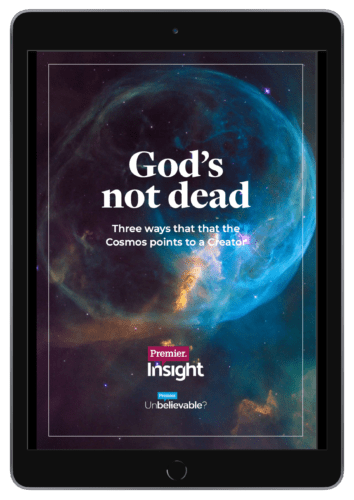
We all killed Jesus. That’s why Jews and Gentiles still both need him.
Posted:Recognising the close bond between Judaism and Christianity should make Gentile Christians more keen to share Jesus as Messiah with their Jewish friends says Charles Gardner.
As a Christian with Jewish family heritage, I relish the challenge of contributing to any substantive debate on Judaism and Christianity and was glad to see The Big Conversation from Unbelievable? recently asking the question: How can we recover the Jewishness of Jesus?
The show involved journalist-priest Rev Giles Fraser explaining the circumstances that led to him rediscovering the Jewish family tree on his father’s side, and Jewish New Testament scholar Amy-Jill (AJ) Levine advocating better ways for Christians and Jews to relate to each other.
Both were generally agreed on the need to rediscover the Jewishness of Jesus, and that persecution was largely to blame in creating a rift between Judaism and Christianity.
Giles made the important comment that, over the first few centuries, Jewish believers in Jesus (of whom he is one) were increasingly written out of the story. This is clearly the root of the problem, and stems from a tragic misunderstanding of the gospel, even by the Church Fathers.
As Giles said, “Jews did not kill Jesus!” And yet the view that Jews were ‘Christ-killers’ has been imprinted on the minds of most Gentiles down the ages, as AJ discovered in one of her early encounters with Christians. Clearly, it was the Romans who crucified Jesus. Of course, a number of Jews, represented by their religious leaders, also collaborated in the dastardly deed.
We All Killed Jesus
But the question of ‘who killed Jesus?’ is not the point.
His death was a sacrifice that God himself had intended. Jesus was the Passover Lamb who takes away our sins, as John the Baptist pointed out (John 1:29). As Isaiah put it, “The Lord has laid on him the iniquity of us all” (Isaiah 53:6). Yes, he was murdered by wicked people – both Jews and Gentiles – but “it was the Lord’s will to crush him and cause him to suffer” (Isaiah 53:10).
In that sense, we are all guilty of killing Jesus – our sins nailed him to the cross. This is the gospel. But we have allowed it to be twisted and warped by playing the blame game.
Without Christ’s death, we can have no resurrection life or any hope for the future. We should be glad that he died for us, not looking around for someone to blame. “If we claim we have not sinned, we make him (God) out to be a liar and his word is not in us” (1 John 1:10).
Christianity Needs Judaism
But in turning on the Jews and writing them out of the script, we effectively invented another religion.
As Paul explains to the Roman believers, where there was tension between the Jews and Gentiles among them, breaking away from our roots in the olive tree that represents Israel would starve us of its “nourishing sap”, and leave us to wither and die. And he warns: “You do not support the root, but the root supports you.” (Rom 11:17f)
Cutting ourselves off from our Hebraic roots suggests that Christianity came out of the blue. But, as Giles insists, Christian faith makes no sense without being understood in the context of the Jewish Scriptures. He rightly says, somewhat provocatively, that “Jesus was not a Christian”. No, he was a Temple-going Jew. And as AJ put it, the Apostle Paul was not a Jewish convert to Christianity. Shock, horror – but also true!
All of which backs up the crucial point I wish to make – that we are not talking here about two different religions at all. As famed author Edith Schaeffer put it, “Christianity is Jewish.”
The Question of Evangelism
My early mentor in the faith was a wonderful Jewish lady who found Christ at Billy Graham’s evangelistic Haringay meetings in 1954. As a John Stott appointee, she taught me the basics of Christianity, but always insisted on referring to herself as a ‘completed Jew’. Jesus said he had not come to abolish the Law (of Moses), but to fulfil it. (Matt 5:17).
I think the big question of the debate revolves around the divinity (or otherwise) of Christ. The best AJ could come up with was that Jesus “had an experience of God”. And yet on several occasions he clearly claimed to be God come in the flesh (e.g. John 8:58, Matt 26:64). If you deny his divinity, you effectively make him out to be a madman for making such bold, and seemingly preposterous, claims. Giles, for his part, believes “Jesus is the Son of God”.
Which brings me to the vital issue of mission. Giles, who though Jewish is a Christian priest, is “very nervous” about mission to Jews, suggesting that they have “a particular relationship with God” and don’t need our help! But that would make a nonsense of Jesus telling his Jewish disciples: “I am the way, and the truth, and the life; no-one comes to the Father except through me.” (John 14:6) Or Peter’s statement, that “Salvation is found in no-one else, for there is no other name under heaven given to men by which we must be saved.” (Acts 4:12)
Paul longed for his own people to accept their Messiah, and wrote prophetically of a time when “all Israel will be saved” (Rom 11:26).
I don’t believe that this phenomenon will be the result of some great religious crusade, but of a merciful nationwide revelation of Jesus as their true Messiah. In the meantime we Gentiles do have a responsibility to preach the gospel “to the Jew first, and also to the Gentile” (Rom 1:16). To withhold the gospel from Jewish people is, in my view, the worst form of anti-Semitism because you are denying them access to the very source of life – blocking off their route to the eternal salvation their own Messiah has promised.
Jesus Is For Jews
Enough of dry theology! What we need to see is changed lives.
The Apostle Paul was so impacted by the risen Jesus that he devoted the rest of his life to mission – to the Jew first, visiting the synagogues of Pisidian Antioch, Iconium and elsewhere before sharing the good news with Gentiles.
Today, so-called Messianic Jews (those who follow Jesus) are discovering their Messiah in the same way as Paul did. Among them is Londoner Brian Greenaway, who initially replied “Sorry, I’m Jewish!” when Gentiles began sharing their faith with him.
Brian actually hated Christians because of the history of terrible persecution Jews had suffered at the hands of the Church. He was also prejudiced against Arabs as he felt they were trying to destroy his people. But the power of God broke through into his life and he is now not only a believer in Jesus, but also an ordained minister who heads up the UK branch of an organisation reaching out to both Jews and Arabs in Israel.
When he finally responded to the promptings of Christ, he said: “Instantly, life changed for me. Suddenly things had colour, purpose and meaning. In subsequent weeks I received the baptism of the Holy Spirit (Acts 1:5) and healing from depression. I was also healed of an ulcer and soon became physically much healthier.”
This kind of encounter with Jesus of Nazareth is available to everyone. As a Messianic Jewish evangelist in Jerusalem says to her regular guests who are seeking answers, ‘Why don’t you just ask God for a sign?’ Debating is one thing, but an encounter with the living Christ is what you really need!
Charles Gardner is author of books including King of the Jews and Israel the Chosen
Watch Giles Fraser & AJ Levine discuss ‘Can we Recover the Jewish Jesus?’
